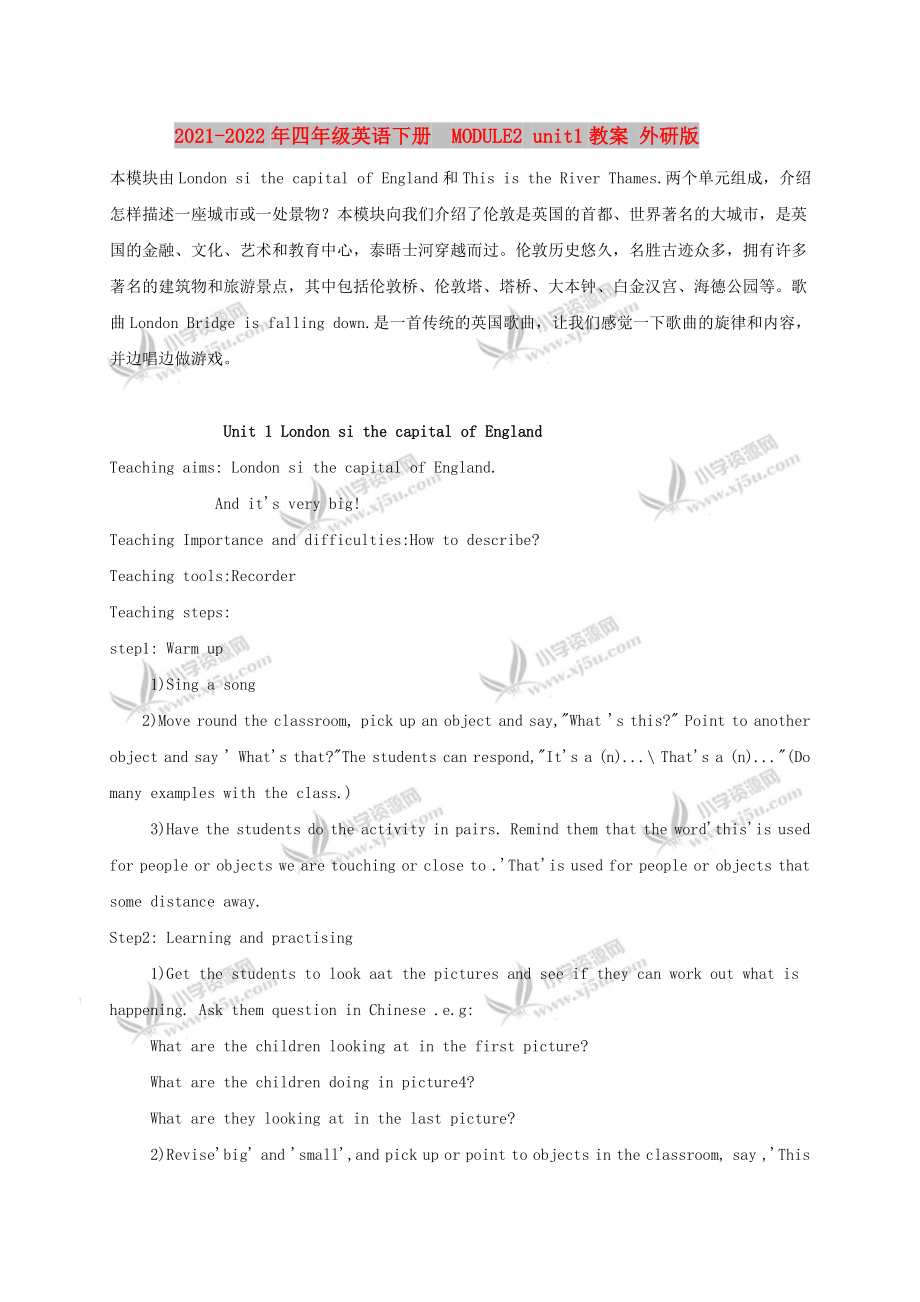《2021-2022年四年級(jí)英語(yǔ)下冊(cè)MODULE2 unit1教案 外研版》由會(huì)員分享���,可在線閱讀�����,更多相關(guān)《2021-2022年四年級(jí)英語(yǔ)下冊(cè)MODULE2 unit1教案 外研版(4頁(yè)珍藏版)》請(qǐng)?jiān)谘b配圖網(wǎng)上搜索���。
1、2021-2022年四年級(jí)英語(yǔ)下冊(cè) MODULE2 unit1教案 外研版
本模塊由London si the capital of England和This is the River Thames.兩個(gè)單元組成���,介紹怎樣描述一座城市或一處景物�����?本模塊向我們介紹了倫敦是英國(guó)的首都����、世界著名的大城市,是英國(guó)的金融�����、文化�����、藝術(shù)和教育中心�,泰晤士河穿越而過(guò)��。倫敦歷史悠久���,名勝古跡眾多���,擁有許多著名的建筑物和旅游景點(diǎn),其中包括倫敦橋�、倫敦塔��、塔橋�、大本鐘��、白金漢宮�����、海德公園等�����。歌曲London Bridge is falling down.是一首傳統(tǒng)的英國(guó)歌曲��,讓我們感覺(jué)一下歌曲的旋律和內(nèi)容����,并邊
2、唱邊做游戲���。
Unit 1 London si the capital of England
Teaching aims: London si the capital of England.
And it's very big!
Teaching Importance and difficulties:How to describe?
Teaching tools:Recorder
Teaching steps:
step1: Warm up
1)Sing a song
2)Move round the cla
3���、ssroom, pick up an object and say,"What 's this?" Point to another object and say ' What's that?"The students can respond,"It's a (n)...\ That's a (n)..."(Do many examples with the class.)
3)Have the students do the activity in pairs. Remind them that the word'this'is used for people or object
4、s we are touching or close to .'That'is used for people or objects that some distance away.
Step2: Learning and practising
1)Get the students to look aat the pictures and see if they can work out what is happening. Ask them question in Chinese .e.g:
What are the children looking at in t
5����、he first picture?
What are the children doing in picture4?
What are they looking at in the last picture?
2)Revise'big' and 'small',and pick up or point to objects in the classroom, say ,'This is \That is small' or 'This is \That is big.'(Do many examples with the class.)
3)Tel
6�����、l the students that you are giong to pick up or touch things and they have to say if they are big or small.Remind the students that they will have to use 'that's' as they will be some distance away from the objects.(point to some of the things in the story and have individual students tell you if th
7�、ey are big or small.)
4)Point and say
revise the adjectives the students know, including colours,e.g. big small,naughty.clever,short,thin,fat, small,long, red,yellow.
Now point to objects on different pages in the book and say what each one is . The students have to make a stateme
8����、nt about each object using an adjective.( Have the students continue the activity in pairs.)
Step3: Homework
附送:
2021-2022年四年級(jí)英語(yǔ)下冊(cè) MODULE3 unit1(1)教案 外研版
Teaching objectives:1 words and phrase:picnic take great ball why beacause so
2 Sentence: We’re going to have
9、a picinic
Will you take your kite����?
Yes,I will./No, I won’t.
3 Grammar: Talk about plan
Teaching properties: picture CAI Tape
Teaching procedures:
A: Songs: London Bridge Following Down
10��、 B: Free talk: Our school
C: New concepts:
Step1: Warmer:
Teacher show some pictures about the “Hyde Park River Thames”
S1: This is Big Ben. It’s very old and very beautiful.
S1: This is Hyde Park. It’s very beautiful.
S3: ...
Step2: Listen and point
11�、.
T: It’s a ball. (Show the ball) I’m going to play ball. Will you play with me?
S2: Yes, I will.
T: I’m going to go to Hainain. Will you take a ball? (同時(shí)板書)
S2:No����,I won't.
Step3: Teacher shows the cards about the new words. Students follow the teacher .The students read one by one .
12、I play the tape and the students follow the recorder.
S1: Will you go to Huanren tomorrow?
S2: Yes, I will.
S3: Tomorrow we’re going to have a Music lesson.
S4: No, I won’t.
Step4: Will和going to 的用法評(píng)出最好的一組��。
Game:A: Two students play a game .They choose one food or one object a
13��、nd do the action.
S1: Will you take some noodles?
S2: No, I won’t.
S1: Will you take a cake?
S2: Yes, I will.
B: Four students look some pictures and tale about.
A: We’re going to go to Hainan tomorrow. I will take my coat and my hat. Will you take your swimsuit? (用CAI)
B: No, I won’t. I’ll t
14、ake my coat, too. Will you take your gloves?
C: YES, I Will…
D:
評(píng)出最佳一組給sticker
Slep5: Do homework and exercise.
Design:
Module 3 Picnic 1 Will you take your kite?
take We are going to have a picnic.
picnic Will you take your kite?
great
ball Yes, I will. / No, I won’t.
why
because
so
 2021-2022年四年級(jí)英語(yǔ)下冊(cè)MODULE2 unit1教案 外研版
2021-2022年四年級(jí)英語(yǔ)下冊(cè)MODULE2 unit1教案 外研版

